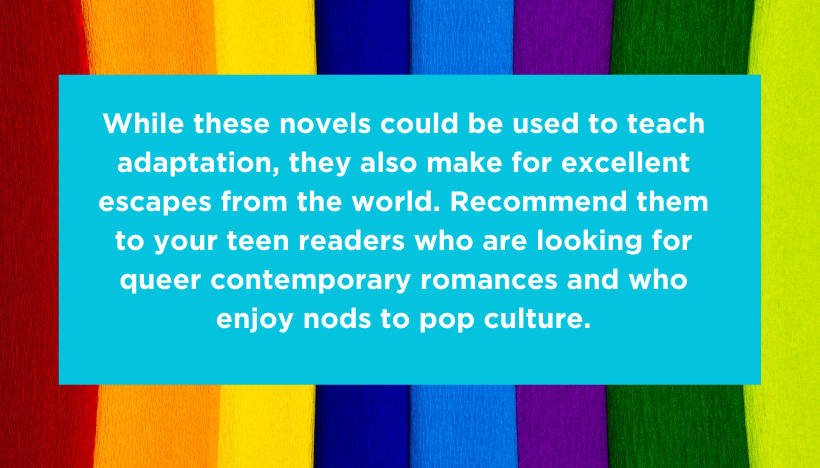From the NCTE LGBTQ+ Advisory Committee
This post was written by NCTE member Summer Pennell, a former member of the NCTE LGBTQ+ Advisory Committee.
As Cody Miller and I wrote in 2020, readers are looking for nostalgia to escape from the ongoing global pandemic and political events such as the recent attempted coup. We’re tired, and we need something to briefly take our minds off the chaos while we wait for our turn to get the COVID-19 vaccine. Young Adult literature can be a great escape. Here I recommend two queer YA titles inspired by television shows or movies.
As a queer reader myself, I enjoy reading books inspired by other stories that alter the narrative to focus on queer characters. While some television series use queer-baiting to draw in an LGBTQ+ audience, suggesting there will be queer relationships that then never happen or are not fundamental to the plot, the books highlighted here center queer relationships. These titles can be great additions to classroom libraries when it is safe to return to in-person schooling, and in the meantime, can be recommended to students looking for a fun escape.
The Gilmore Girls was a television series created by Amy Sherman Palladino that aired from 2000 to 2007, and then had a four-episode Netflix reboot in 2016 called “A Year in the Life.” The show centers on a “freakishly linked” mother and daughter pair, Lorelai and Rory, and is still popular 20+ years after it debuted. While Rory had several boyfriends throughout the show, her most constant companion was her prep school and college classmate and frenemy Paris Gellar. To many queer viewers, myself included, Rory and Paris are the OTP (one true pairing). Their chemistry on screen inspired a lot of fanfiction (The Best of It is my favorite). Lucky for fans of this ship, there’s a fun YA book inspired by them: Tell Me How You Really Feel by Aminah Mae Safi.
Safi’s dedication reads “For Amy Sherman Palladino. Thank you for never giving Rory Gilmore a decent boyfriend. She’s always had Paris,” setting the tone for a delightful imagining of what a Rory and Paris relationship could have been like through her characters Sana Khan and Rachel Recht. Sana is the perky, aspiring medical student and cheerleader to Rachel’s antisocial film-obsessed character. They’re both ambitious, and it’s a joy to read this enemies-to-lovers and opposites-attract romance plot play out. While the Gilmore Girls series had terrible representation for people of color, Safi’s main characters offer authentic representation of a Muslim, Persian, Indian girl in Sana and of a Jewish Mexican girl in Rache—characters who have their own rich backgrounds separate from the elements inspired by Rory and Paris.
Any reader who loves enemies-to-lovers and opposites-attract romances, smart feminist main characters, and girls speaking up for what they want will enjoy this book. Being a Gilmore Girls superfan just makes it more fun, as seeing how Safi played with the characters’ relationships and plots from the show adds an extra layer. All the chapter titles are also tongue-in-cheek pop culture references, making this a great book for xennials like me to read with teen students or family members, so we can annoy them by over explaining all the inside jokes.
Grease, released in 1978 (and based on a 1971 musical), tells the story of Sandy and Danny who shared a summer romance in the 1950s. When goody-two-shoes Sandy unexpectedly transfers to Johnny’s high school for their senior year, she learns he has a tough guy persona that differs from the sweet boy she dated. This film remains a teen classic, as a prequel is currently in the works, showing the longevity of this story’s appeal.
Sophie Gonzales’s Only Mostly Devastated takes the summer romance between Sandy and Danny and reimagines it as a romance between two boys: jock Will and musician Ollie. When Ollie’s family decides to stay in North Carolina to help care for his Aunt Linda and her two young children, Ollie finds himself transferring to Collinswood High School. Immediately, he falls in with a group of three girls (Gonzales’s version of the Pink Ladies from Grease) who take him to a party where he sees Will, only to learn that Will is not out. This narrative has fewer direct ties to Grease than Tell Me How You Really Fell has to the Gilmore Girls series, but it is still fun to see the nods to the film and how it is transformed into a contemporary teen romance.
This novel will appeal to readers who have experienced grief and who like coming-out stories, secret romances, complex friendship dynamics. The cast of characters is also racially diverse, although race does not play a large part in the plot or character development. There is, however, careful attention to fat phobia and beauty standards.
While these novels could be used to teach adaptation, they also make for excellent escapes from the world. Recommend them to your teen readers who are looking for queer contemporary romances and who enjoy nods to pop culture. Reading a queer romance in which you know from the start that things are going to work out romantically between the main characters is relaxing. Readers may have differing opinions about characters’ choices, but in these novels, you don’t have to worry if the main pairing ends up together, and can instead enjoy the journey of how they find their way to each other. In our increasingly uncertain world, that can be comforting.
 Summer Melody Pennell is a former member of NCTE’s LGBTQ Advisory Committee and is the past chair of NCTE’s Genders and Sexualities Equality Alliance (GSEA). She is an assistant professor of English education at Truman State University, where she works with preservice English teachers, and also teaches an undergraduate LGBTQ+ YA Literature course for all majors. She can be contacted via email at spennell@truman.edu and found on Twitter @summerpennell.
Summer Melody Pennell is a former member of NCTE’s LGBTQ Advisory Committee and is the past chair of NCTE’s Genders and Sexualities Equality Alliance (GSEA). She is an assistant professor of English education at Truman State University, where she works with preservice English teachers, and also teaches an undergraduate LGBTQ+ YA Literature course for all majors. She can be contacted via email at spennell@truman.edu and found on Twitter @summerpennell.
It is the policy of NCTE in all publications, including the Literacy & NCTE blog, to provide a forum for the open discussion of ideas concerning the content and the teaching of English and the language arts. Publicity accorded to any particular point of view does not imply endorsement by the Executive Committee, the Board of Directors, the staff, or the membership at large, except in announcements of policy, where such endorsement is clearly specified.

